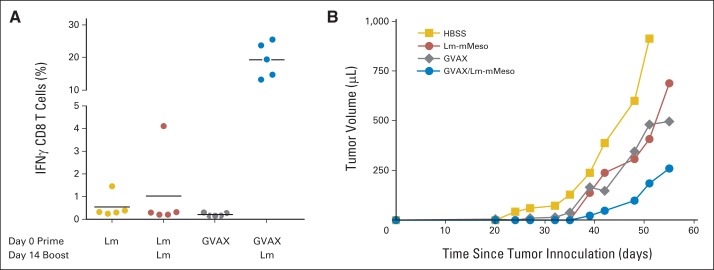Fig A1.
Heterologous prime/boost of GVAX and Listeria-based vaccines induces robust antigen-specific T-cell immunity and delays tumor growth in experimental mouse pancreatic tumor model. (A) AH1-specific T-cell responses at peak of response in BALB/c mice. On day 0, BALB/c mice (n = 5) were immunized with either 5 × 106 colony-forming units (CFUs) of Lm-AH1 (Lm) intravenously (IV) or 1 × 106 cells of GVAX subcutaneously (SC). On day 14, specific groups were boosted IV with 5 × 106 CFUs of Lm. Seven days after prime and 5 days after boost, spleens from mice were obtained, and interferon gamma (IFN-γ) AH1-specific immune responses were assessed by intracellular cytokine staining. (B) Therapeutic antitumor efficacy of combination of GVAX and Lm in C57BL/6 mice. On day 0, C57BL/6 mice (n = 10) were implanted SC with 1 × 106 Panc02 cells. On day 3, GVAX animals were pretreated with cyclophosphamide 100 mg/kg and PC-61 50 μg. On day 4, mice were vaccinated either SC with 6 × 106 cells of GVAX (3 × 106 irradiated Panc02 cells plus 3 × 106 irradiated B78H1 cells) or IV with 5 × 106 CFUs of Lm-mouse mesothelin (Lm-mMeso). Fourteen days after vaccination, indicated groups were boosted IV with 5 × 106 CFUs of Lm-mMeso. Mice were monitored over time, and tumor growth was measured twice per week. HBSS, Hank's balanced salt solution.

